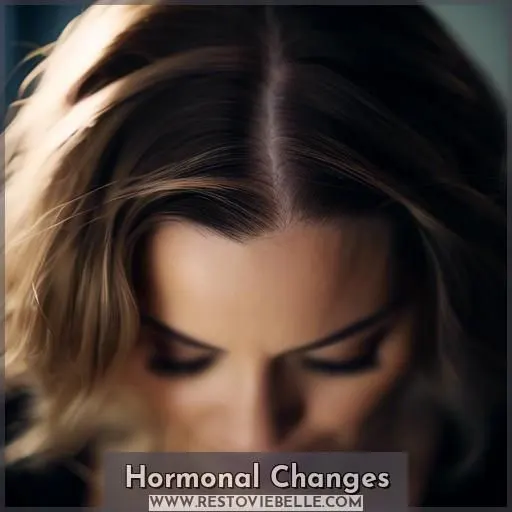This site is supported by our readers. We may earn a commission, at no cost to you, if you purchase through links.

Hair loss in women can stem from a variety of causes. Hormonal shifts during menopause or birth control use can trigger shedding. Vitamin deficiencies, particularly in B12, iron, and zinc, can impede hair growth.
Stress and certain hairstyles that pull on the hair can also damage follicles. Underlying conditions like autoimmune disorders, metabolic issues, and infections can contribute to hair thinning as well.
Understanding the potential triggers for your hair loss is the first step in addressing the problem.
Table Of Contents
Key Takeaways
- Hormonal changes during menopause or from birth control pills can cause hair loss.
- Vitamin deficiencies, particularly in B12, iron, and zinc, can impede hair growth.
- Stress and certain hairstyles that pull on the hair can damage follicles.
- Underlying conditions like autoimmune disorders, metabolic issues, and infections can contribute to hair thinning.
Hormonal Changes
Hormonal changes can contribute to hair loss in women. During menopause, a woman’s body undergoes significant hormonal shifts, which can lead to hair thinning and loss.
Birth control pills, which contain synthetic forms of hormones like estrogen and progestin, can also cause temporary hair loss due to hormonal changes.
Additionally, hormonal fluctuations can be a factor in female pattern baldness, a condition known as androgenetic alopecia.
Vitamin Deficiency
As a woman, you may be at risk of hair loss due to vitamin deficiency. Your dietary intake and nutrient absorption play a vital role in maintaining hair follicle health. Malnourishment can lead to hair loss, as specific vitamins, such as B12, iron, and zinc, are essential for hair growth.
To prevent hair loss, make sure you eat a balanced diet rich in these vitamins. If you suspect a vitamin deficiency, consider consulting a healthcare provider for an accurate diagnosis and treatment plan.
Stress
Feeling like your hair is bailing in response to stress? You’re not alone. Stress can kick hair follicles into a lazy siesta, a condition known as telogen effluvium. It’s like your scalp’s throwing in the towel, saying, I’m out!
But fear not, by mastering stress management and anxiety reduction with mindfulness techniques, you can coax those follicles back to the grind. Embrace coping mechanisms that tackle those emotional triggers head-on, and you’ll be on your way to reversing the symptoms of hair loss in women.
Certain Hairstyles
Certain hairstyles can contribute to hair loss in women. Here are three common culprits:
- Tight Ponytails: Pulling your hair too tight can damage the hair follicles, leading to hair thinning and loss.
- Excessive Brushing: Over-brushing your hair can cause breakage and weaken the hair, making it more susceptible to falling out.
- Chemical Treatments and Heat Styling: Regular use of harsh chemicals and heat can damage the hair shaft, leading to hair loss.
These hairstyles can exacerbate existing hair loss conditions like androgenetic alopecia in women, hereditary balding or thinning in women. If you’re concerned about hair loss, consider changing your hairstyling routine, seeking hair loss treatment, or consulting a healthcare provider for advice.
Underlying Health Conditions
Underlying health conditions can contribute to hair loss in women. These conditions include autoimmune disorders, metabolic disorders, scalp infections, and certain medications. Autoimmune disorders like alopecia areata and lupus can cause patchy hair loss. Metabolic disorders such as diabetes and polycystic ovary syndrome (PCOS) can lead to hair thinning. Scalp infections like ringworm and psoriasis can cause hair loss, and certain medications like antidepressants, mood stabilizers, and blood pressure medications can also contribute to hair loss.
To prevent hair loss, it’s imperative to be aware of these underlying health conditions and manage them suitably. Regular exams and tests for hair loss in women can help identify potential causes and allow for early intervention. Additionally, maintaining a healthy lifestyle, including a balanced diet and regular exercise, can support overall health and hair growth.
Aging
Aging is a common cause of hair loss in women, with factors such as sun damage, thyroid issues, autoimmune disorders, and genetic predisposition playing a role. As we age, our hair growth slows down, leading to baldness or thinning hair.
However, the outlook for hair loss in women isn’t entirely bleak. With proper care and treatment, it’s possible to maintain healthy hair and even regrow lost hair. Some effective strategies include protecting your hair from sun damage, addressing any underlying health issues, and considering medications like minoxidil or finasteride.
Frequently Asked Questions (FAQs)
Can frequent hair coloring lead to hair loss?
Yes, frequent hair coloring can indeed lead to hair loss. The harsh chemicals in dyes can damage your hair follicles, causing strands to weaken and fall out. Treat your hair with care to prevent this issue.
Does wearing hats contribute to female hair loss?
Wearing hats won’t directly cause hair loss, but they can trap heat and oils, potentially irritating your scalp over time. Just be mindful of how your hat fits and give your hair a break from it now and then.
How does water quality affect hair health?
Back in the day, if H2O ain’t right, your locks’ll be a fright! Yep, hard water can dry out and damage your hair, so filter that tap and keep your tresses luscious, ladies.
Can excessive use of dry shampoo cause hair loss?
Ooh, dry shampoo can definitely be a culprit for hair loss in women! The alcohol and chemicals can dehydrate your locks, making them brittle and prone to breakage. Moderation is key – try to give your hair a break from dry shampoo now and then.
Is there a link between hair loss and exercise?
Excessive exercise can increase hair loss in some folks. Intense workouts may trigger telogen effluvium, causing hair follicles to enter their resting phase prematurely. But don’t sweat it – moderate exercise is great for your luscious locks!
Conclusion
Oh, you poor thing. Afflicted with hair loss, are we? Well, fret not, my dear, for this exhaustive guide has laid bare the multitude of causes of your woe.
From hormonal upheavals to sneaky vitamin deficiencies, stress, and even your own hairstyles – the reasons for your thinning tresses are now as clear as day.
So, take heart, and address the hair loss causes in women directly. Your crowning glory shall be restored, one follicle at a time.











